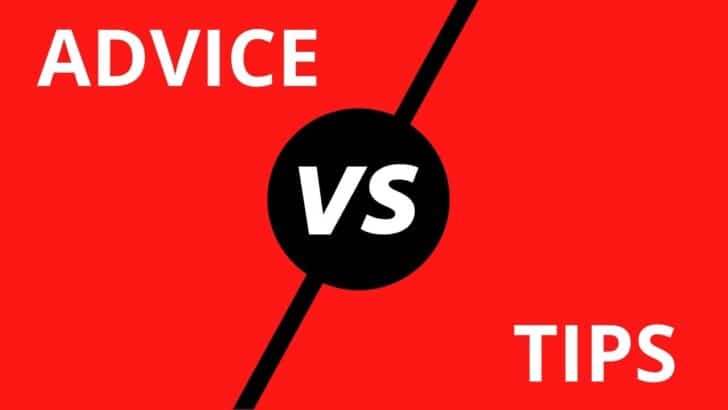Ever come across two words you thought were identical, only to have someone tell you they’re not?
English is full of word pairs like this.
Some, like retail vs resell, are specialized words.
Others are surprisingly common.
Take the words “advice” and “tips.” Is giving a tip the same as giving someone advice? Should you ask for advice or for tips?
The answer to these and other questions will soon be revealed!
What is the difference between advice and tips?
Advice is an opinion about what kind of action to take. Tips are information given by an expert on a specific topic. Tips can be advice, but they aren’t always. That’s because tips can be factual, and they can be broader than discussing a specific action someone is considering.
Two similar words with subtly different meanings
The difference between advice and tips often gets mixed up in everyday usage.
This is no surprise, as advice and tips both involve one person sharing a suggestion for what to do with another.
In fact, while the two words don’t mean the same thing they can be interchangeable in very specific circumstances.
So how do you tell the difference between a tip and a piece of advice? As always, the key to understanding language is to look at usage and definitions.
The anatomy of advice
The Oxford English Dictionary defines advice as an “opinion given or offered as to what action to take,” noting that the word can be a synonym for “recommendation.”
As noted, advice clearly involves suggestions.
The type of suggestion, however, is important: rather than any old suggestion, advice deals with a specific action you might be considering.
The other key word in this definition is the word “opinion.”
When someone is giving out advice, all they can really do is suggest how they might act.
In most cases, advice is not based on any kind of objective assessment of a situation. Instead, it’s a subjective artform.
The lowdown on tips
Let’s take another look at the Oxford English Dictionary. The entry for tips says that they are “useful private or special information communicated by an expert” and that they may be considered “a friendly hint.”
It’s pretty clear that there are several major differences between the definitions for tips and advice.
For one thing, tips are “private” or “special” rather than generalized. Additionally, the only people who can hand out tips are “experts.” (Unfortunately, no expertise is required for advice!)
Telling tips and advice apart
Realistically speaking, it doesn’t matter if someone is giving you a tip or giving you advice.
The best thing to do is listen and consider what they’re telling you before you make your move.
Still, it’s useful to know how you can tell advice and tips apart.
In their most common form, tips are factual and deal with something in a specialized field, while advice is an opinion-based suggestion on how or why to act.
For example, a scientist telling a new student the best way to use a microscope to isolate bacteria for observation is giving the student tips.
A scientist telling a student how to use a blue heart emoji to respond to his boyfriend’s text message is giving advice–and probably not good advice, either!
Finally, it’s important to remember that while the words advice and tips are different, they can be used interchangeably in some rare cases.
For instance, tips can be advice if they’re based on an opinion and involve what to do in a situation.
If our scientist’s tips are not about how to use the microscope to get the best results but just things that she thinks might make it easier to use during the lab tomorrow, those tips are also advice.

Hey fellow Linguaholics! It’s me, Marcel. I am the proud owner of linguaholic.com. Languages have always been my passion and I have studied Linguistics, Computational Linguistics and Sinology at the University of Zurich. It is my utmost pleasure to share with all of you guys what I know about languages and linguistics in general.

